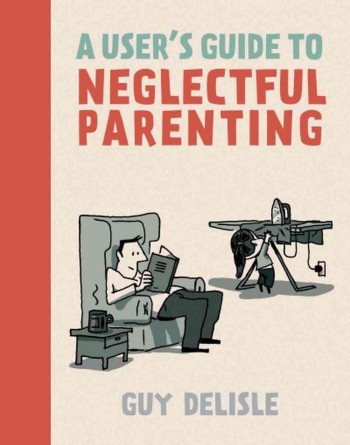 Home > CR Reviews
Home > CR Reviews A User’s Guide To Neglectful Parenting
posted November 3, 2013
A User’s Guide To Neglectful Parenting
posted November 3, 2013

 Creator:
Creator: Guy Delisle
Publishing Information: Drawn and Quarterly, softcover, 192 pages, $12.95.
Ordering Numbers: 9781770461178 (ISBN13)
The best thing, and maybe the only important thing, about this Guy Delisle non-travelogue book that found its way to the marketplace during a crowded summer of 2013 is that it's occasionally very, very funny. Granted, whether or not you laugh here may depend on something of a pre-existing appetite for humor where adults berate, one-up and otherwise doing reasonably mean but never drastically harmful things to children. Many possess an inexhaustible hunger for such work and I count myself among those that prefer Walter Matthau to Fred Rogers while valuing both. Some of the extended bits in
User's Guide feel like effective improvisational theater acts honed and fashioned over multiple re-tellings: think of the revue that Second City does before the late-night, more free-form laboratory material. Many also feel classically constructed, pivoting around broad identities in a way that would score a laugh in 1953 and 2013. This includes a segment where Delisle teaches his son to strike a heavy bag that could have appeared on a black and white television show, and an extended scene where the cartoonist starts to praise his daughter for her artistic accomplishment but quickly heads into "don't get cocky" territory with hilariously over-articulate, modulated fury recognizable from any Post-World War 2 parent.
Guy Delisle's art in
A User's Guide To Neglectful Parenting puts on display the sneakily solid construction that the cartoonist has brought to bear through a style not particularly celebrated for its handsome single-image making. He draws everything with authority and clarity. His own stand-in figure exudes an underlying decency that ameliorates any downside we might attribute to the moments of disdain or teasing. The kids slouch and communicate their world-beating despair and dismay and boredom with unusual aplomb. Delisle extracts fine
performances from his characters, an invaluable comics-making skill. I might question the format, although I'm not sure there's a strong alternative answer to be derived there. These are comics that suggest you fire through them while reading, and I could have easily read twice their number in a single sitting. As it is, the collection felt a bit light, even at 192 pages. I liked everything I read, and wanted more.


